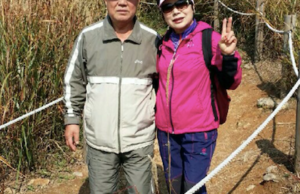Korean heritage holds many lessons

By: Scott Miller
I was raised to love everyone equally. Everyone was born as equals. No one is less than anyone else. I just assumed that everyone was made different and loved the same. That’s what my mom taught me. I didn’t think about how my brother and I were being raised. I didn’t think that when my mom called my aunt “Oni” that it meant anything other than her name. It wasn’t. As I grew older I began to realize that wearing shoes in the house wasn’t that big of a deal and that not everyone ate rice for every meal. After realizing that not all younger brothers called their older brothers hyung, I realized my family was different.
It didn’t faze me when I realized we were different than other families. We still do things a lot different. The expectations for us may be different, and the way we speak to others may be different, but in the same manner, there are a lot of things that are the same too.
Being raised in a half Korean household, we still celebrate Christmas, but it’s a little different. We still have Christmas together as a family — my mom, dad and brother — but we set aside New Year’s Day to celebrate it all together with all my cousins, aunts, uncles and grandparents on New Years Day. Along with the traditional ham and turkey, my grandma makes Korean food: chopchey, fried rice, kimchee, bulgogi and my favorite egg rolls. My mom, grandma and aunts spend days preparing our meal. They cut the veggies, marinate the meat, mix the kimchee, and the whole time they are cooking they are laughing, talking and my mom and aunts are learning.
Being raised in a Korean-American home, I have different expectations than most American kids my age. I never call my aunts and uncles by their name. They are not Aunt Jeanine and Uncle Rob. To me they are Emo, Sumo, Emobo, Samchun and my grandma and grandpa are halmeoni wa hal-abeoji. Younger siblings address their older siblings with titles as well. Older brother is Hyung. Older sister is Oni. Your spouse is not to be called sweetheart, but instead is to be called Yobo. You are to address you elders with the title not their names.
Being Korean, we have different things that would be considered disrespectful than my unhyphenated friends. Stepping over someone who is sitting on the floor is disrespectful, holding one hand out to accept something is rude, calling an elder by their given name is disrespectful and wearing shoes in the house is disrespectful. The list goes on and on, but only when you think about it does it seem picky and weird. I mean I never knew that people didn’t take their shoes off until I spent the night at a friend’s house, and heywalked in the house and to the bedroom without removing his shoes. I remember standing there wondering what to do. I did take my shoes off, but I wondered then why would he be so disrespectful.
Birthdays are also something we do differently. In a Korean family, you have your 100-day birthday, your first birthday and your 60th birthday. These three are the most important. On your 100-day birthday, in Korea you would be one. This is the one year mark from conception. The celebration isn’t huge. All the kids in my family received their baby ring on that day. My mom still wears ours on a necklace. This is when, in the olden days, that the family gave thanks and offerings for the well being of the mother and child. This is celebrated with rice and soup. It was believed that if you shared 100 rice cakes on this day, the baby would live a long life.
Then is the first birthday. This is probably the best known of the Korean birthday celebrations. Tables are set and decorated with bright rice cakes, fruits, meats and sea weed soup. The baby is dressed in a brightly colored outfit called a dol-bok. Food is not the only thing on the table. There is thread, a brush, calligraphy set, pencil, book, money and a ruler. The baby picks up various things on the table, and it is said that this predicts the baby’s future. The pencil, calligraphy set and book indicate a good scholar, while rice cakes and money mean the child will be rich. The ruler and scissors show the child will be creative. I picked up the brush, money and a ruler.
Being Korean we also celebrate different holidays than Americans. As a Korean growing up, I celebrated Children’s Day. This is a holiday in Korea that celebrates children. Celebrated on May 5, Children’s Day is a day that we get gifts from our parents. The morning would start with a breakfast of rice and seaweed soup. The day is spent with family. The best part was that on Children’s Day, we were given presents. Mom always made sure we got a new book.
I am the hyphen in Korean-American. I celebrate Korean holidays and American holidays. I eat Korean and American foods, and I have been brought up where the values of a Korean family dominate my American culture, but I have the best of both worlds, and, to be honest, I wouldn’t change it for anything.








You must be logged in to post a comment Login